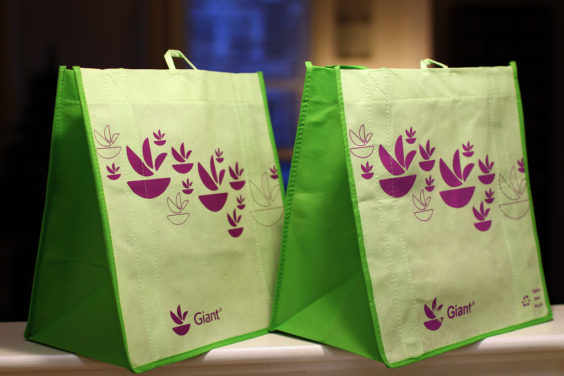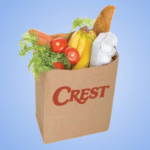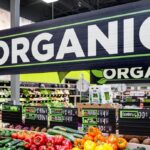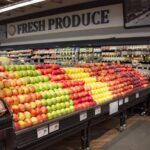
They may be good for the environment, but a new study suggests that reusable grocery bags might be bad for your budget.
Researchers from the Harvard Business School found that those who go grocery shopping with reusable bags tend to buy more pricey organic food – which is not necessarily a surprise, since those who favor reusable bags might be the types who prefer more environmentally-conscious food. What is surprising, though, is that they also found that reusable bag users tend to buy more junk food, too.
Their conclusion? It’s all the bags’ fault.
In their paper, “How Bringing your Own Shopping Bags Leads to Treating Yourself, and the Environment” researchers Uma R. Karmarkar and Bryan Bollinger analyzed data from nearly a million transactions over a two-year period at an unnamed California grocery store. They then supplemented that data with shopping simulation surveys, to see what kinds of products reusable and regular bag users chose.
What they found, was “the presence of a bag increases the probability that items purchased are organic.” At the same time, reusable bag users were more likely to purchase “indulgent” products.
They conclude that the bags themselves may be issuing psychological cues to shoppers. A bag “can signal or prime people to increase their consideration of environmentally responsible or ‘green’ goods,” the researchers write. And “as an indication of having engaged in a virtuous behavior, we hypothesize that bringing one’s own bags can license individuals to treat themselves by making more indulgent choices.”
So ultimately, if you bring your own bags to the store, you may fill them up with more stuff – and end up spending more – than other shoppers who opt for paper and plastic.
The findings could have retailers seeing dollar signs. The study estimates that if everyone were to use reusable bags, and their purchase decisions were affected accordingly, it could mean an extra three-quarters of a billion dollars in annual profits for the grocery industry.
So can retailers manipulate us into spending more in their stores, by forcing reusable bags upon us? It’s not that easy, the researchers say. Shoppers’ spending only goes up, when they “can comfortably take credit for having brought their own bags,” the researchers write. When shoppers are forced to bring their own bags, either due to store policy or local laws, they’re less inclined to buy more.
Instead, the study suggests that retailers should strongly encourage reusable bag use – and help shoppers make healthier choices in the process. “Our results suggest that promoting offerings like organic or sustainably farmed fresh foods as indulgences should increase their purchase rates,” the researchers write. That solution could preserve retailers’ higher profits, and keep shoppers from overdoing it on the chips and ice cream at the same time.
Of course, there’s another way to ensure that you don’t spend more when bringing your own grocery bags – bring coupons, too. A California-based entrepreneur is developing a “coupon-friendly” reusable bag that he hopes to have available for sale soon. The “Shopping Bag Solutions” bag encourages coupon use, by doubling as a coupon holder. It has a clear window pocket on the side, where users can keep their coupons. And the website dedicated to the product even features an “incentives gallery” (a page featuring Coupons.com coupons), so users can print offers right from the site.
“Incentives work to change behavior,” Shopping Bag Solutions’ Chandler Hadraba told Coupons in the News. “Rather than create a new program, why not use what is already there, solving two problems at once? Namely, the $300 billion in coupons consumers missed out on last year, and people forgetting to bring their bags with them to the store.”
So reusable bags could help shoppers remember to use $300 billion worth of coupons, and coupons could help make a dent in that three-quarters of a billion extra dollars that the Harvard study estimates reusable bag shoppers could end up spending each year. If you shop smart, it seems those reusable bags may not be so expensive after all.














Pfft. Wealth, it’s all about wealth.
Rich folks buy pretty fabric bags w/ ‘status symbol’ logos, artwork and green messages. (Poor people tend to go more for those free bags, the ones that are handed out at checkout.)
“Going Green” in the U.S. today is an indulgence of the wealthy elite. To some extent, it’s even a status symbol. (Ok not all, but by a large majority.)
I wish I could prove it-but I can’t. But I steadfastly believe that if you find out where the highest retail sales of organic meats, produce and dairy are taking place-that’s where you will find the rich people.
Think of it this way: Rich people buy just as much processed, calorie rich, nutrient poor junk food as everyone else. They just have the luxury to gild the lily w/ the organic stuff too. Maybe it’s like the story said: to compensate, to atone for the junk. The why is really not all that nuanced-it’s because they can afford to.